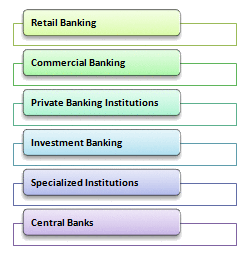There is lot more to banking term than what most of the people recognize. Not all banks are shaped in equal manner or to operate for the same reason with same fundamentals. Since individuals or corporate have diversified needs of finance. “Different types of financial institutions and banking institutions are operated to classify services based on distinctive types”. Name banks subject to large entity they are further divided into types based on universal arrangement of capital principles.
Bank is one of the types of financial institutions or intermediary institutions for various financial necessities and dealing either directly or indirectly with financial system of nation’s economy. Due to this important factors banks are highly regulated by nation’s government or central bank of country. Banking industry is divided into different types based on client requirements for products and services.
Types of Financial Institutions
Financial institutions are those institutions who uses techniques to convert individual savings into financial investments and loans. Let us understand some of the types of financial institutions in this module.
Commercial Banking
Commercial banks provide administrations services such as making business advances, offering fundamental investment schemes, encouraging saving deposits, fixed deposits, Issuing bank drafts and bank cheques, giving overdraft facilities, bond investment schemes, cash management, mortgage loans, debit cards, credit cards, etc.
There are two types of commercial banks, Public Commercial Banks and Private Commercial Banks. Public commercial banks refers to types of financial institutions in which government holds major stake usually to emphasize on social objectives than on profitability. Whereas Private Commercial Banks are fully owned, managed and controlled by private supporter and they are free to operate without any government interference. For more details refer to the tutorial links.
Insurance Companies
Insurance companies are financial entities that assist individuals in transferring the risk of experiencing a financial loss. A large number of individuals who want to protect themselves or their loved ones from certain losses pay payments to an insurance firm, which pools the risk and reduces the cost of insurance. Automobile accidents, fires, incapacity, lawsuits, disease, and death are all examples of losses that might occur. Insurance firms also assist people and businesses in risk management and asset preservation.
Brokerage Companies
Brokers companies are types of financial institutions which acts as an middleman between purchasers and sellers. They primarily help in the execution of securities transactions. Brokerage businesses allow their customers to conduct transactions in a variety of securities, including stocks and bonds, mutual funds, exchange-traded funds (ETFs), and certain alternative assets.
After a transaction is successfully completed, a brokerage business is rewarded through commission payments. When a trading order for particular stocks is executed, for example, a transaction fee is often charged to the individual who placed the order. He pays this charge in exchange for the efforts made by the brokerage firm in order to complete the transaction.
Mortgage Financial Institutions
Mortgage companies are financial firms that originate or provide funding for mortgage loans. While the majority of mortgage firms cater to the needs of individual consumers, a few are focused only on financing solutions for commercial real estate.
Types of Banking Institutions
Banking institutions are the a trust bank or you can say companies which are mainly known as affiliate of the custodian, sub-custodian subsidiary of custodian or custodian. Let us see some of the types of banking institutions.
Central Banks
A reserve bank, central bank, or monetary authority refers to a financial institution that manages a states or country. In term of currency, interest rates, currency valuation. Central bank holds monopoly in increasing monetary base also by prints the national currency. Central bank functions mostly include managing foreign exchange and gold reserves, implementing monetary policy, acting as a banker’s bank at time of crisis, making official policies regarding interest rates.
Such banks holds superior power to protect country man by punishing banks or institutions for performing any reckless or fraudulent behaviour. Central banks are mostly designed and recognised as an independent and politically free entity. Examples: Reserve Bank of India (RBI) is the central bank of India, Bank of England, European Central Bank (ECB), People’s Bank of China, Federal Reserve of the United States of America, etc.
Retail Banking
Retail banking is the procurement of administrations by a bank to individual rather than to organizations, corporate or other banks. Administrations offered services like savings, money transfers, loans, cheques, cards, etc. The term retail banking mostly recognize as financial institutions for managing an account administrations for individuals or managing retail clients which distinguish it from other banking types. To further understand retail banking refer to tutorial links.
Private Banking
The expression “private” refers to administration services more on personal basis rather than mass population (Retail Banking). Private Banks refer as financial institutions for managing accounts, investments and other services offered by banks to high-net worth individuals (HNI) who are categories as high income professionals or large investors.
Private banks subject to an essential part of wealth management for high income groups. They provide services like: assets management, tax advisory, financial brokers, offered solitary relationship manger. To understand types of private banking and financial institutions in more elaborated way, refer to the tutorial course links.
Investment Banking
An investment bank refers as a consultant or assisting institution for individuals, organizations and governments in raising capital by underwriting assets. And/or performing broker in issuing securities. An investment bank likewise assist organizations in simplifying acquisitions and mergers, trading in derivatives, equities, currencies, commodities by providing auxiliary services. Investment bank does not provide deposit services like commercial banks or retail banks.
Investment bank can likewise be divided into private and public based on information capacities and data obstruction. The private ranges deals with private insider data that cannot be freely disclosed, while public range such as stock examination deals with public data. For more details refer to tutorial course links.
Specialized Financing
Banks offering various specialized services away from traditional banking are called as specialized banks. Specialized banks are those types of financial institutions which referred as foreign exchange banks, development banks, industry and mine banks, farms and agriculture banks, aboriginal banks (providing financial products and services to aboriginal communities), export-import banks with unique needs.
Some specialized banks are governed and regulated by state or central governments or both for re-structuring, planning and development of the country. Specialized banks and financial institutions are broadly categories into three types of specialized banks, they are:
- Export Import Banks (EXIM Banks).
- Small Industries Development Banks.
- Agricultural and Rural Development Banks.
Conclusion
Banks are one of the types of financial institutions. Their main role is receiving deposits, collecting funds, lends money, transfers funds from one person to another, safeguards money and more. Hope this concept of financial institutions types has improved your knowledge in understanding finances.
Read E-Learning Tutorial Courses - 100% Free for All
Basics of Banking and Financial Services for Beginners
- Chapter 1: What is Bank and Role of Bank in Economic Development
- Chapter 2: Different Types of Financial Services Provided by Banks
- Currently Reading: Different Types of Banking and Financial Institutions
- Chapter 4: What is Retail Banking and Services provided by the Banks
- Chapter 5: What is Commercial Bank and Services offered by Banks
- Chapter 6: What is Private Banking and Services offered by Best Banks
- Chapter 7: What is Investment Banking and Services offered by Bankers
- Chapter 8: What is Investment? How to Start Systematic Investment Plan?
- Chapter 9: What is Fixed Income Securities Market?
- Chapter 10: What are Bond Funds? Difference between Stocks and Bonds
- Chapter 11: What is Stock Market? How to Invest in Stock Market?
- Chapter 12: What is a Mutual Funds? Types of Mutual Funds with Examples
- Chapter 13: What is Futures Trading? How to Trade in Future Contracts?
- Chapter 14: What is Options Trading? How does Options Trading Works?
- Chapter 15: Banking Quiz - Basics of Banking and Financial Services for Beginners







